
A How-To Guide on Bypassing the iPhone 14 iCloud Lock

A How-To Guide on Bypassing the Apple iPhone 14 iCloud Lock
Have you bought a second-hand Apple iPhone 14, and it is iCloud locked? Or, do you own an Apple device yet have forgotten its iCloud credentials? Regardless of your issue, you can’t use the locked phone without Apple iPhone 14 iCloud bypass. It is indeed a troublesome experience and can delay your work.
You might attempt to contact Apple support, yet they won’t help you directly without user confirmation. You will get many questions, and they might request the first iOS device payment receipt, even after the confirmation of the Apple iPhone 14 device.
Therefore, we have compiled this Apple iPhone 14 iCloud bypass guide to help users remove the activation lock. So, if you are facing these issues, stay with us till the end to find a solution.
- 1. Get Apple ID and password from the original device owner
- 2. Use DNS Bypass
- 3. Emergency Call
- 4. Dr.Fone - Screen Unlock

Part 1: 4 Efficient Methods to Bypass Apple iPhone 14 iCloud Activation Lock
1. Get Apple ID and password from the original device owner
For an Apple iPhone 14 iCloud bypass, you’ll require a couple of significant pieces of data:
- Bypassing the Activation Lock on iPhone is as straightforward as signing in to the Apple iPhone 14 device. It would help if you had the Apple ID credentials of the previous owner.
- If a device doesn’t have the activation lock, you might see the passcode screen instead of the activation lock screen. Therefore, you should have the Apple iPhone 14 passcode in mind.

After getting the required details, the following are the steps to perform Apple iPhone 14 iCloud bypass:
- Step 1: Go to the Settings application on your Apple iPhone 14.
- Step 2: Tap the Apple ID photograph from the highest point of the screen. If the Apple iPhone 14 device has a newer version of iOS, then, at that point, you should tap the iCloud choice.
- Step 3: Now tap the “Sign Out” button. You can sign in using your own Apple ID from that point onward.
- Step 4: Next, look down and tap the “Sign Out” choice. When asked, you should enter the Apple ID password of the past owner to disable the Find My iPhone choice.
On the other hand, if you see the lock screen passcode, you can type the passcode and set up the Apple iPhone 14 device without the Apple ID.
With the Apple iPhone 14 device completely set up, access your device’s Settings and sign out of the old Apple account. You can now make one more ID and Sign into it.
2. Use DNS Bypass
What is DNS?
Domain Name System (DNS) changes over the readable names into numeric IP addresses. It utilizes the DNS server as a host to run the app. If your device is iCloud locked, one good way is to change its activation path through the DNS strategy and send it from the first Apple server to the iCloud Bypass DNS server for validation.
You can change the IP server path from the Wi-Fi settings, even if the activation screen is sprung up and you can’t utilize the Apple iPhone 14 device. You can enter the manual Wi-Fi setting and change the DNS address. This section focuses on how you can perform Apple iPhone 14 iCloud bypass via DNS bypass.
Steps to Follow:
Note: Before performing the iCloud DNS bypass, ensure that your device has a SIM card embedded. This step is mandatory for this process to work.
- Step 1: Select your nation and language from the menu on the screen.
- Step 2: When you continue it, you will be coordinated to the Wi-Fi setting page, requesting that you connect with a WIFI connection. Search for the “I” icon close to the Wi-Fi network.
Note: If you don’t see the “I” icon close by, press the Home Button> More Wi-Fi Setting and search for it.
Step 3: You must disconnect the Wi-Fi. When you find the “I” icon, go to the settings tab and select the “Forget this Network” option.
Step 4: Click “I” and enter a DNS server to bypass iCloud Activation Lock as per your area, against the DNS tab. Pick one from the given IP addresses according to your region:
USA: 104.154.51.7
South America: 35.199.88.219
Europe: 104.155.28.90
Asia: 104.155.220.58
Australia and Oceania: 35.189.47.23
Other landmasses: 104.155.28.90
Step 5: After entering the IP address, tap the Back choice at the left of the screen. Now, turn on Wi-Fi, select the Wi-Fi network from the rundown and enter the code.
Step 6: You will see the next page choice; don’t click it and press “Back”. Now you are on the iCloud Bypass screen.

- Step 7: Look down the page, go to the menu and set up your applications, music, camera, and so forth.
3. Emergency Call
Utilizing the Emergency call strategy is another free Apple iPhone 14 iCloud bypass method. It is among the clearest and speediest procedures to remove your iCloud account. The guidelines underneath will show you how to unlock your iCloud free by utilizing the Emergency Call technique:
- Step 1: Turn on your Apple iPhone 14. Select your preferred language and current region.
- Step 2: Now, on the iCloud activation screen, press the home button three times to begin on Voice Command and multiple times to close down.
- Step 3: Again push on a home button, and this time select Emergency Calls.
- Step 4: Now, you need to key in *#96274825*0000*1#. Then press the call button multiple times.
- Step 5: Then, you need to modify the last digit from 1 to 2 and repeatedly press the call button.
- Step 6: Perform this strategy once more. When you adhere to every one of the guidelines, press the back button, and turn around to the starting screen.
- Step 7: Now, just like you did before, select your language and country. After picking it, you will see the bypass screen.
4. Dr.Fone - Screen Unlock
How would I remove the past owner’s Mac ID from an iPhone? Removing the past user’s Apple ID from your iOS device could be difficult if you don’t know the Apple ID credentials. Yet, it is possible due to expert Apple ID bypass software.
If you’re searching for the fastest method for eliminating the activation lock on your Apple iPhone 14, look no further from Dr.Fone - Screen Unlock (iOS) . This expert program is extremely convenient when you can’t open your iOS device without a password, or you’re experiencing an activation issue. Dr.Fone is fit for rapidly unlocking/bypassing Apple ID from any iOS device. After the Apple iPhone 14 iCloud bypass, you can use your Apple iPhone 14 with no issues.
Step-by-step Guide:
Step 1. Install the Dr.Fone program to the computer and launch the Screen Unlock tool from the home page.
Step 2. Find the “iCloud Activation Lock Removal” button, click it and start to bypass the lock.
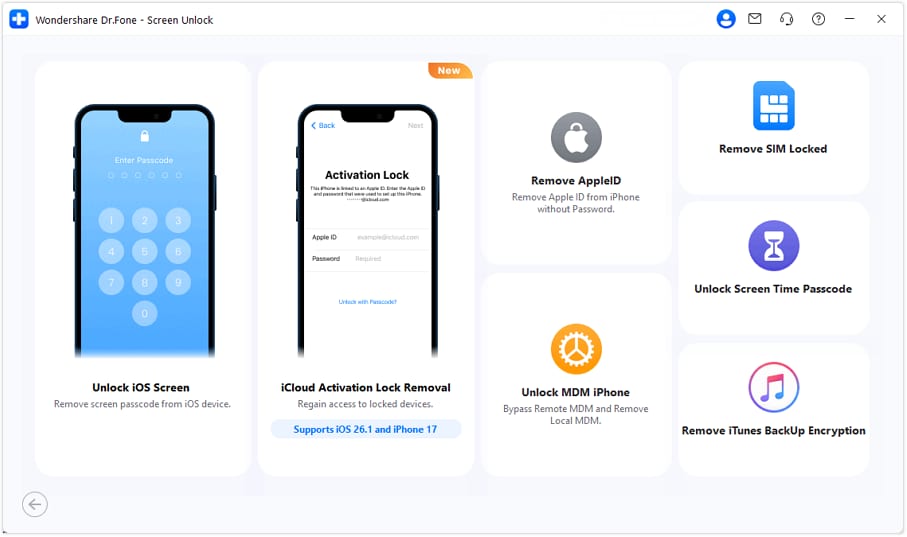
Step 3. Before bypassing the activation lock on your Apple iPhone 14/4s, here is the “Start”.
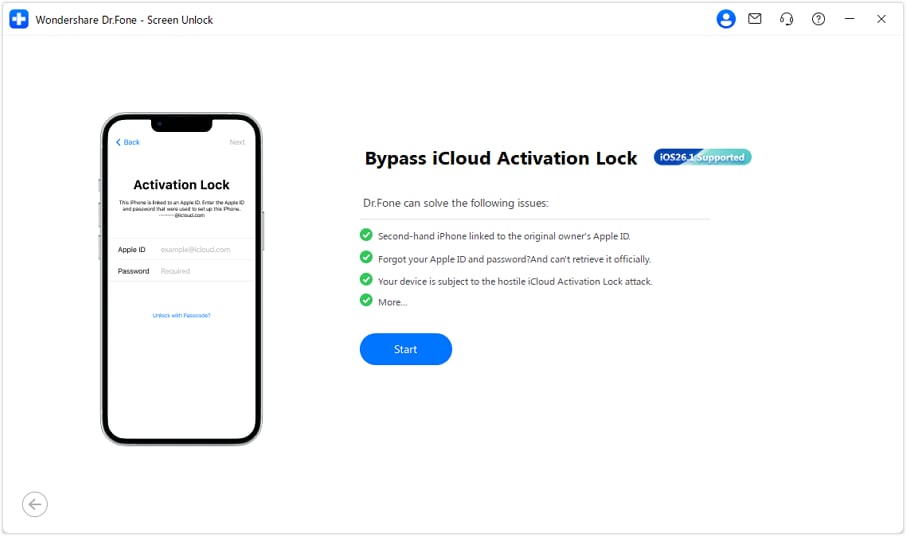
Step 4. Now you’re having an iPhone without the activation lock, you can prepare a new Apple ID for this device.
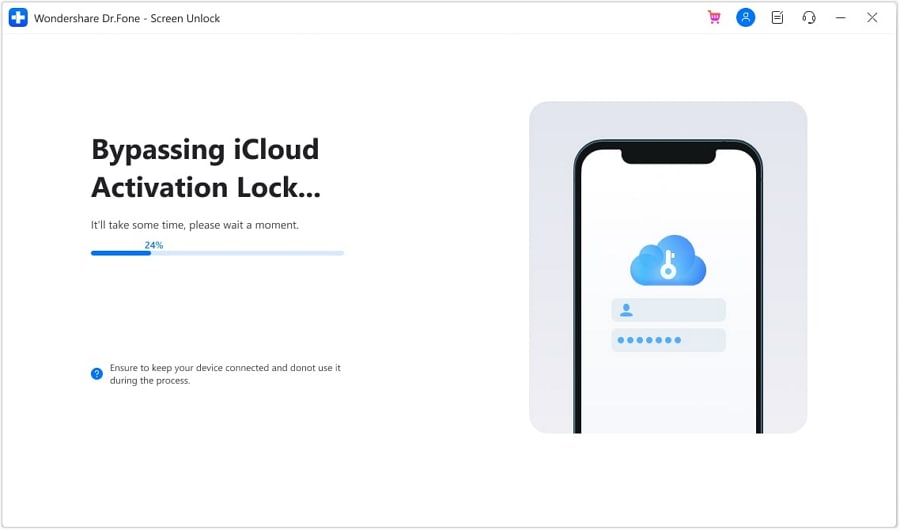
When arriving at this final page, the whole process is done.
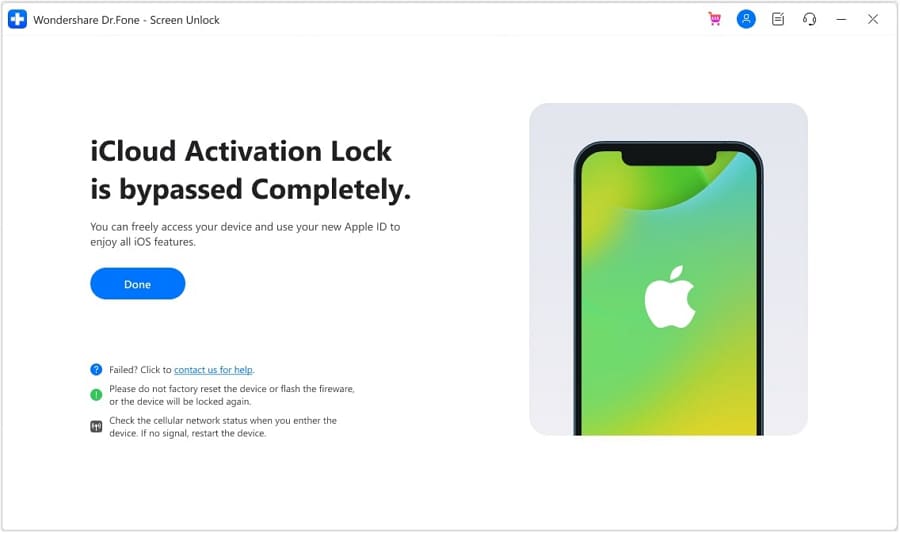
Your iPhone will start normally. You can access and utilize all the features of your phone now. Remember that you can’t utilize your new account’s phone call, data, and iCloud features after bypassing them.
Part 2: FAQs
When do we need to bypass Apple iPhone 14 activation lock?
If you have bought a used phone, and it shows the activation lock screen, you may need Apple iPhone 14 iCloud bypass. The activation lock screen happens when you buy a phone from someone else, and they forget to remove the phone from their Apple ID.
Once the lock activates, you can’t reset and use different features of your phone. Therefore, the activation lock can be a troublesome experience for many. So, in such situations, you need to remove/bypass the activation lock through different techniques.
Note: Activation lock ensures the safety and prevents you from buying a stolen phone, which may create problems for you in the future.
What to do to turn off Find My?
- Open up the Settings menu.
- Select your name from the menu. Then select Find My choice.
- At the top of the following page, Tap Find My iPhone and flip the setting off.
- Enter your Apple ID credentials when asked and press “Turn Off”.
The Bottom Line
In this informative guide, we have listed the Apple iPhone 14 iCloud bypass methods. However, if you don’t have the Mac ID credentials to initiate your Apple iPhone 14, you will require help from an expert program that can bypass the Apple iPhone 14 activation lock. Therefore, we strongly suggest Dr.Fone - Screen Unlock (iOS) . Download the problem-free Dr.Fone activation lock bypass program to get rid of the lock on your Apple iPhone 14.
What You Want To Know About Two-Factor Authentication for iCloud On your Apple iPhone 14
Hackers have stolen millions of iCloud credentials in the past and demanded Apple pay for a ransom. This is starting to become a thing of the past as Apple implemented two-factor authentication to secure your Apple ID.
However, it’s not always perfect, as sometimes you need to get past two-factor authentication on your iCloud for various reasons. That’s why this article will teach you how to set it up and bypass two-factor authentication on iCloud yourself if you need to. Read further to learn more.

Part 1: What Is Two-Factor Authentication for iCloud?
Not to be confused with Apple’s two-step authentication, the new and more secure two-factor authentication on iCloud introduces push notifications on your iOS device to keep your data safe. With Apple’s two unique ways to prove your identity, hackers will find it harder to access your personal and financial data.
Switching to two-factor authentication rather than two-step is becoming more common nowadays as security measures are more advanced. You can always switch your security measure at any point, but remember that two-factor authentication is now an essential way to keep your data safe.

Part 2: What Are the Benefits of Two-Factor Authentication?
Setting up two-factor authentication is a secure way to protect your device against unauthorized access. Adding another layer to your username and password highly reduces the chances of hackers obtaining your account.
Here are some of the benefits of activating two-factor authentication on your device.
- Improved security - A second form of identification aside from your password reduces the chance for someone to gain access to your information.
- Interconnectivity to mobile engagement - Two-factor authentication from businesses provides users with a stronger login system to ensure their information is safe in the digital world.
- Reduces Fraud - Due to the rise of identity theft in recent years, businesses risk losing trust, brand equity, and credibility. A secure authentication system adds a layer of protection to keep you secure.
Part 3: How To Set up Two-factor Authentication for iCloud?
If you haven’t set up two-factor authentication yet on your iCloud, here are the steps to activate it right now.
Step 1: On your Apple iPhone 14/iPad, go to Settings and tap your Apple ID profile at the top.

Step 2: Tap Password & Security and turn On Two-Factor Authentication.
Step 3: Enter a phone number to receive the two-factor code via an SMS or a phone call.
Step 4: Enter the 6-digit verification code received on your device and wait for the process the finish.
Note
You can turn off two-factor authentication within two weeks of enrollment. After that, it’s permanent.
Part 4: How To Turn Off Two-Factor Authentication on Your Apple iPhone 14?
As previously stated, once two-factor authentication is active on iCloud, you only have a two-week window to deactivate it again.
To get past two-factor authentication on iCloud, Go to Settings > your name > Password & Security. Tap Two-Factor Authentication and turn it Off again.
Meanwhile, here are the steps to learn how to bypass 2-step verification on iCloud on the web.
Step 1: Go to the Apple ID sign-in page and log in with your Apple ID.
Step 2: Click Sign-In and Security > Account Security.

Step 3: Click Turn Off Two-Step Verification. Answer a security question you’ve set up previously to finish the process.
Part 5: Is It Possible to Bypass Two-Factor Authentication for iCloud?
If you’re wondering how to bypass two-factor authentication on iCloud, the answer is no, you can’t. However, if you don’t have access to your trusted device, you can have a code sent to your trusted phone number via an SMS or an automated phone call to prove to Apple that you own the iCloud account.
If this is impossible, you should request account recovery to regain access to your account.
The easiest way to prevent this issue is by adding another phone number to your Apple ID so you’ll always have a backup. Here’s how.
Step 1: On your Apple iPhone 14, go to Settings and tap on your Apple ID > Password & Security.
Step 2: Tap Edit and choose to Add a Trusted Phone Number. You’ll have to enter your device’s passcode to continue.

Step 3: Enter your new phone number. Select a way to receive a verification code via sms or phone call and tap Send.
Step 4: Enter the verification code and wait for the process to finish.
Bonus Tips: Forgot Your iCloud Password? Here’s What To Do
Using special programs like Dr.Fone can help you recover your iOS device if you forget your iCloud password.
Dr.Fone’s key features are:
- Removes all types of iPhone locks such as Apple ID password, Face ID, Touch ID, and more.
- Bypass iCloud activation lock.
- Unlock your Apple iPhone 14 without carrier restrictions.
- Remove MDM profile / bypass MDM lock without data loss.
Here’s how to use Dr.Fone if you forget your iCloud password.
Step 1: Download and install Dr.Fone .

Step 2: Click Screen Unlock on the main program window. On the next screen, click Bypass Activate Lock.
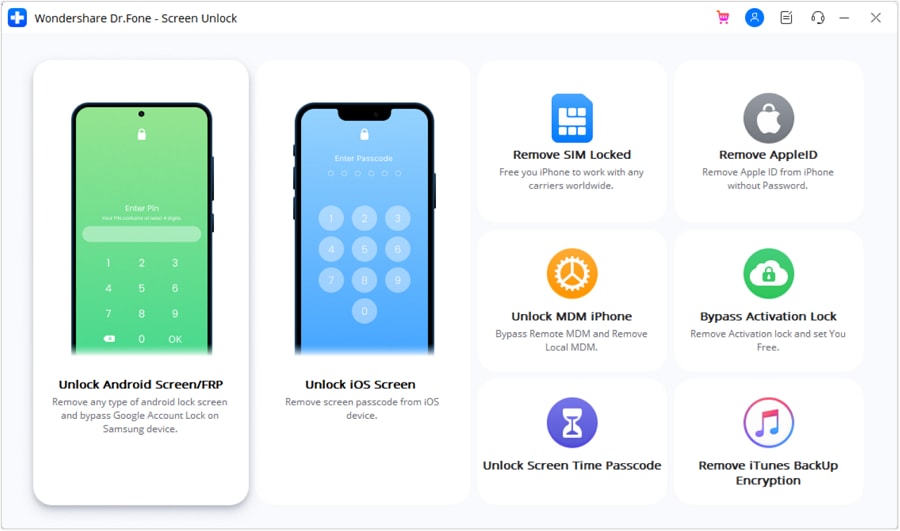
Step 3: Click Start to initiate the process of unlocking your Apple iPhone 14 without an iCloud password.

Note
Your iPhone will need to be jailbroken before bypassing it using Dr.Fone.
After step 3, there are two possible outcomes for GSM and CDMA iPhone devices.
- If you own a GSM device, the unlocking will do no harm to your iOS device, and you can enjoy your Apple iPhone 14 as usual.
- If the Apple iPhone 14 is CDMA, you won’t be able to use the Apple iPhone 14 device for phone calls, cellular data, and iCloud of your new Apple ID.
Conclusion
Turning on your iCloud’s two-factor authentication is necessary for today’s high-tech society. It ensures your information is always secure and minimizes the risk of getting hacked or having your account stolen. Once two-factor is active on your Apple ID, Apple provides you with a two-week window to deactivate it if you change your mind.
Meanwhile, if you forgot your iCloud and have a hard time recovering your account, you can try using dedicated programs like Dr.Fone to unlock your iOS device in a few steps.
Effective Ways To Fix Checkra1n Error 31 On Apple iPhone 14
Apple distinguishes itself as a leading smartphone manufacturer by implementing rigorous security protocols. These measures pose challenges for users seeking to jailbreak their iOS devices. Such actions grant users the capability to remove the restrictions enforced by Apple on their devices.
Serving as the primary tool for this purpose, Checkra1n emerges as a popular choice. Nevertheless, similar to any other tool, Checkra1n may face a range of issues, among which Checkra1n Error 31 is notably notorious. This guide aims to help you address Checkra1n Error 31. Moreover, it will introduce a powerful alternative to Checkra1n jailbreak iOS devices.

Part 1. Figuring Out All Possible Reasons for Checkra1n Error 31
Understanding the reasons behind Checkra1n Windows Error 31 is essential in resolving this issue. The reason can relate to the software and hardware aspects of running Checkra1n. Here are some of the reasons why you are encountering Checkra1n error 31:
- Temporary Computer Issues: As Checkra1n is a computer-based tool, issues within your computer can cause the error code 31. These issues can be insufficient resources, compatibility issues, or temporary glitches.
- Mismatched Checkra1n Version: When jailbreaking an iOS device, you must use the right version of the tool. Using incompatible versions of Checkra1n can lead to issues such as error code 31.
- Issues with USB Connection: A major cause behind Checkra1n error 31is the unstable or faulty USB connections. If your device is not properly connected, it will lead to the failure of the jailbreak process.
- **Device Compatibility Issues:**Apple has introduced many measures to ensure that newer devices are hard to jailbreak. That’s why if you use the latest iOS device, there is a high chance it is incompatible with Checkra1n.
- **Security Software Interference:**In rare cases, the security or antivirus software installed on your system can interfere with the working of Checkra1n. Similarly, the Windows firewall can sometimes flag Checkra1n as a virus, disturbing the jailbreaking process.
Part 2: [Top Fixes] Resolve Checkra1n Error 31 to Jailbreak iOS Device
Encountering errors like Checkra1n jailbreak Error 31 is a typical occurrence in the jailbreaking process. Fortunately, there’s no cause for concern, as there are various solutions readily accessible to diagnose and address this particular error. Discussed below are the top 6 fixes to streamline your iOS jailbreaking process:
Fix 1. Wondershare Dr.Fone – Screen Unlock (iOS) Providing a Direct Jailbreaking Solution
While Checkra1n is widely employed for jailbreaking iOS devices, it has notable limitations. This is especially the case concerning compatibility with the latest iOS versions. Therefore, we recommend considering a dependable alternative like Wondershare Dr.Fone. It offers iOS users a user-friendly approach to conducting jailbreaks on their devices.
Working as a dependable companion for iPhone users, Dr.Fone simplifies the jailbreaking process. It especially benefits users grappling with iOS security locks, particularly iCloud activation locks. Notably, Dr.Fone stands out for its compatibility with the latest iOS 17 and iPhone 15 models.
Prominent Features of Wondershare Dr.Fone
- You can bypass all sorts of iOS screen locks, from passcodes to Face IDs.
- Besides unlocking iCloud Activation Lock, it is also an expert in removing SIM locks from the carriers.
- If you have forgotten your iTunes backup encryption password, Dr.Fone can remove it without causing data loss.
Steps To Bypass iCloud Activation Lock via Wondershare Dr.Fone
By combining Dr.Fone with the jailbreaking process, users can effectively bypass the iCloud Activation Lock. Detailed instructions are provided below to bypass the iCloud Activation Lock bypass using Dr.Fone:
- Step 1. Commence the Procedure by Activating Dr.Fone
Start by downloading and opening the latest edition of Wondershare Dr.Fone. After completing this step, go to the “Toolbox” section within Dr.Fone and click “Screen Unlock.” Choose “iOS” as your device type, and head to select the “iCloud Activation Lock Removal” option. Now, begin the procedure by selecting “Start” and ensure your device remains connected to the computer throughout this stage.

- Step 2. Jailbreak Your iOS Device
Now, proceed to check if your device is CDMA or GSM. A GSM device will remain the same after iCloud Activation Lock removal. On the other hand, a CDMA device will lose all cellular functionalities. After that, you need to tap “Unlock Now” and agree with the warning by tapping “Got it!” Afterward, you will need to jailbreak your device, for which follow these below-given steps:
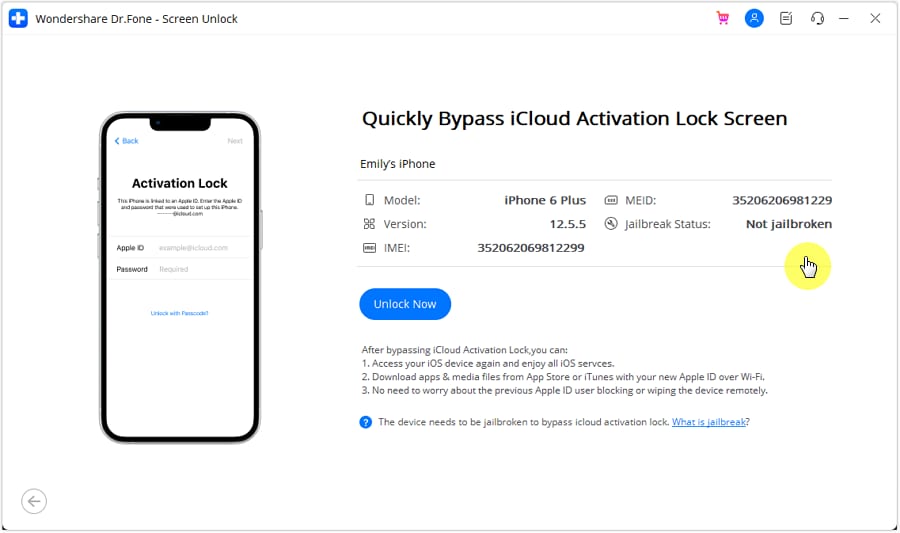
- On a computer with Windows 7 or higher, download checkn1x-amd64.iso and rufus.exe. Connect a USB with at least 2 GB storage to the computer. Next, open the Rufus file and choose “checkn1x-amd64.iso” by clicking “Select.”
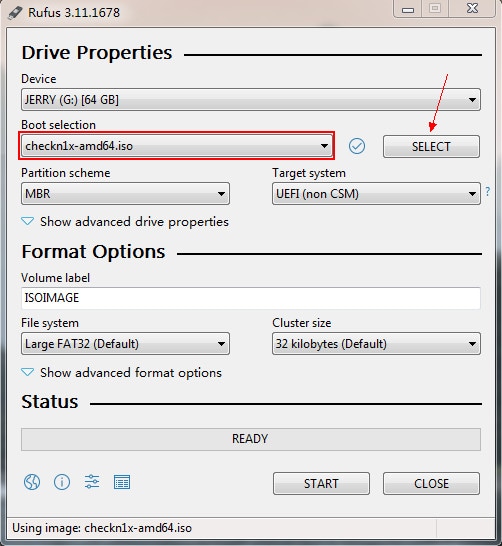
- Now, click “Start,” and on the pop-up window, choose “Write in DD Image Mode.” Then, click “OK” and wait for the process of writing image data to complete. Once completed, tap “Close” and restart your computer with the USB plug-in.
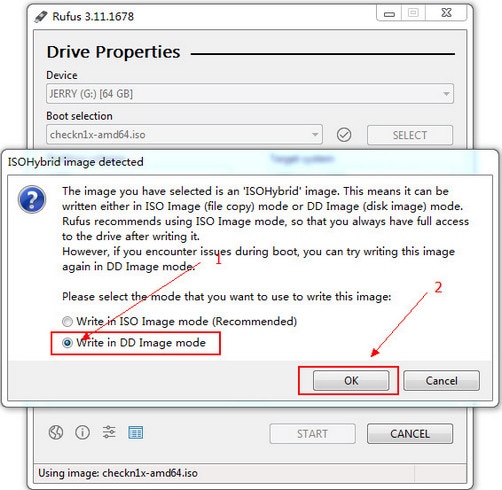
- Press the F12 or relative boot key to access the Boot Menu when the computer restarts. Within the “Boot Menu,” choose the USB and connect your iOS device to the computer. Now, use the arrow keys to move to the “Options” button and press Enter.
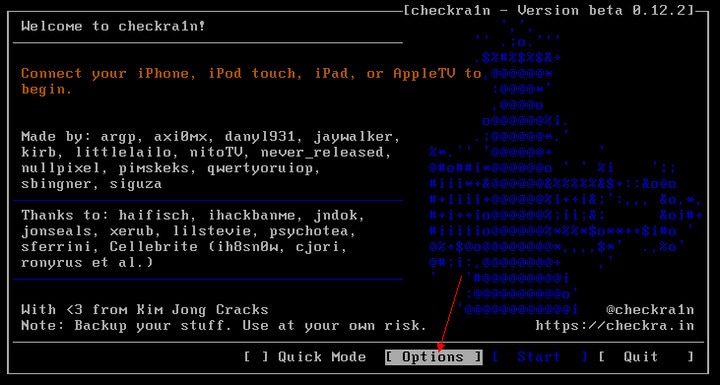
- You must now move to the “Allow untested iOS/iPadOS/tvOS versions” option and hit “Enter.” Follow it by moving to the “Skip All BPR Check” option and pressing “Enter” again. Afterward, move to the “Back” option and use “Enter” to return to the main screen.
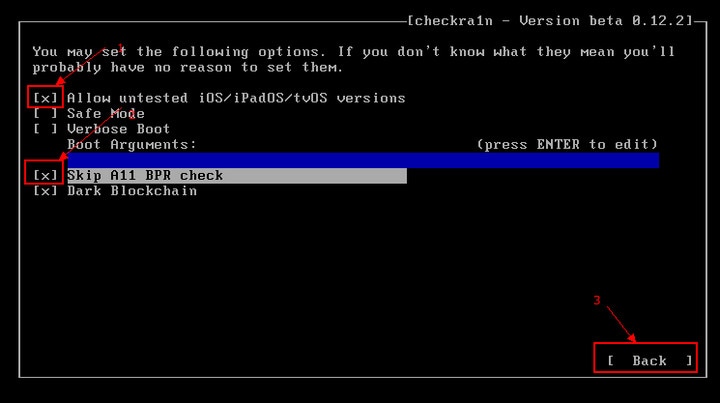
- Once back on the main screen, select “Start” to initiate jailbreaking. For CheckN1x to jailbreak your device, you need to put the Apple iPhone 14 device into DFU Mode. Now, tap “Next” to put your device into Recovery Mode.
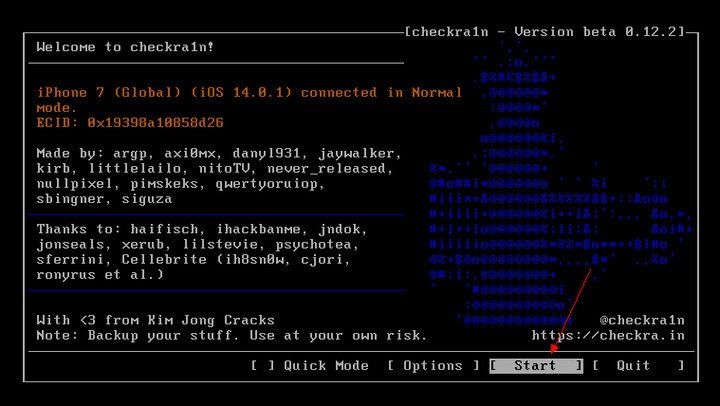
- Once your device is in Recovery Mode, tap “Start” and follow the on-screen guidelines to put it into DFU Mode. When your device enters DFU Mode, Checkn1x will automatically jailbreak it. Finally, select “Finish” and remove the USB to complete the process.
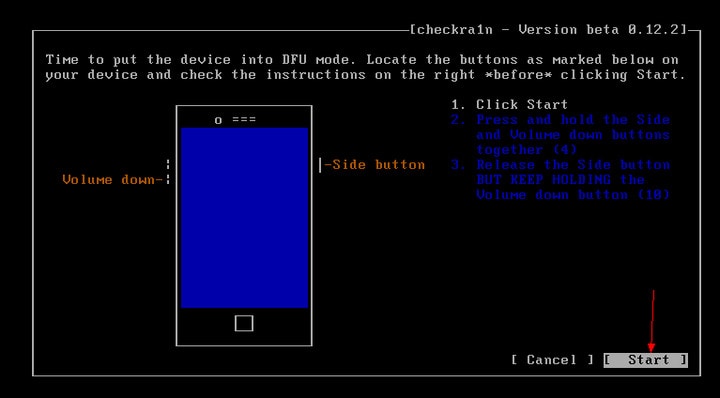
- Step 3. Complete the iOS Activation Lock Bypass Process
Removing the Activation Lock will start as soon as your device is jailbroken. You can follow the progress on the screen, and once it is complete, tap “Done” to conclude the process.

Fix 2. Try Restarting iOS or Computer Device
Sometimes, temporary glitches or bugs within your iOS device or computer can cause the Checkra1n Error 31. The most effective and simple solution in this case is to restart your devices. This simple process removes all temporary glitches and resets all processes. Here is how you can restart your iOS device and computer:
1. Windows PC
Instructions. Click the “Start” button on your Windows PC from the bottom left corner. Here, tap the “Power” icon and select “Restart.”

2. MacBook
Instructions. When using a Mac, click the “Apple” logo from the top left corner. Press “Restart” from the drop-down menu to reboot your Mac.
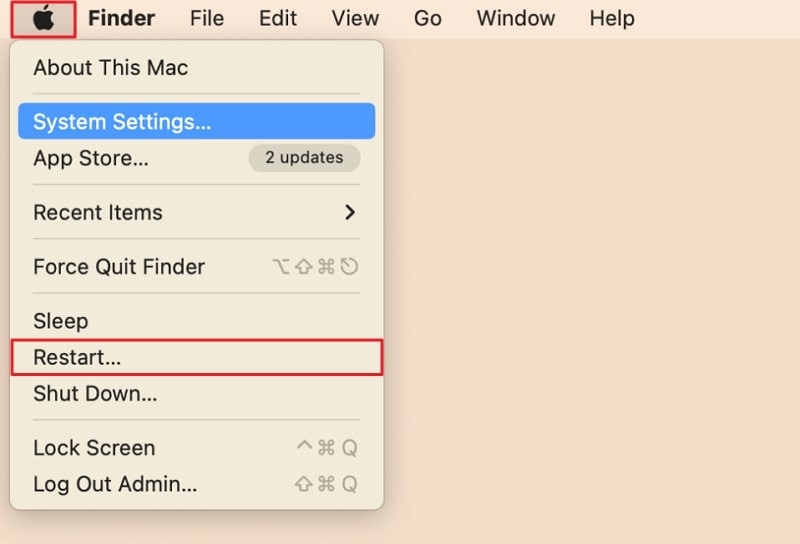
3. iPhone/iPad
Instructions. Press the “Side” and any “Volume” buttons to access the Power Slider screen. Now, move the slider to the right to turn off your device. After waiting some time, press the “Side” button to turn on your iOS device.

Fix 3. Download New Checkra1n Version
Crucial for a successful jailbreak is carefully selecting the appropriate Checkra1n version. Compatibility varies across devices, making it essential to choose the version that suits your device. Error 31 issues are likely linked to the specific Checkra1n version in use. In such instances, the recommended solution is to experiment with alternative versions.

Fix 4. Install iOS Firmware From iTunes and Retry Jailbreaking
When encountering Checkra1n jailbreak, error 31 may be attributed to the iOS version on your device. In such cases, the optimal resolution involves reinstalling the iOS version through iTunes. Follow the steps below to personally choose the IPSW file and employ iTunes for the installation on your iOS device:
- Step 1. Access the ipsw.me website using a web browser and download the compatible IPSW file for your iOS device. Before installing, ensure that the “Find My” service is disabled.

- Step 2. Connect the iOS device to the computer and wait for iTunes/Finder to detect it once all requirements are satisfied. For instance, if you have a Mac with the operating system before macOS Catalina, access the “Summary” tab by clicking the Apple iPhone 14 device icon within iTunes. While holding the “Shift” key on Windows or the “Option” key on Mac, click “Restore iPhone.”

- Step 3. You will be asked to select the IPSW file. Choose the file you downloaded and follow the on-screen instructions to complete the installation process. Once complete, re-try the jailbreaking and see if error 31 is resolved.

Fix 5. Consider Using Other Options in Checkra1n
If the reason behind Checkra1n error 31 is the Apple iPhone 14 device incompatibility, Checkra1n provides an inbuilt way. When jailbreaking a device, Checkra1n allows you to select the “Untested versions” option. While employing this option, you can jailbreak the Apple iPhone 14 device with iOS versions still not tested for jailbreaking. Here is how you can select these options in an attempt to jailbreak your device:
Instructions. To get a clean start, reboot your computer and iOS device and launch the Checkra1n app. Now, click the “Options” and select the “Untested Versions” and “Safe Mode” options. Then, try jailbreaking your device and see if error 31 is resolved.

Fix 6. Try a Special Method While Using Checkra1n
At times, the solutions you are looking for can be found among the experiences of fellow users. We found a Reddit post in our search to find solutions to Checkra1n Error 31. In this post, a Reddit user explained a hack he had found to solve error 31 when jailbreaking using Checkra1n.
Remember that this hack includes a specific Checkra1n version and experience that specific user. While you can emulate the experience, the results aren’t guaranteed. Here is what that user tried for successful jailbreaking using Checkra1n:
- Step 1. Download and install the Checkra1n version 0.10.2 beta on your computer. Now, connect your Apple iPhone 14 to DFU Mode to the system. Initiate the jailbreaking process until the “Right before Trigger” option appears.

- Step 2. The user suggests you unplug the cable and re-plug it after waiting for 5 to 7 seconds. According to the user, this action should do the trick. To get out of DFU Mode, press and hold both buttons (Home + Lock) for 10 seconds and go on to release the home button.

Bonus. Jailbreak iOS Using Mac: A Simple Guide To Refer To
Looking for a tool to jailbreak an iOS device on a Mac? Wondershare Dr.Fone has you covered there, as it also provides a comprehensive guide to jailbreaking an iOS device from Mac. You will need to download the Checkra1n tool and a USB cable to connect your Apple iPhone 14. Once you have both, use the following steps to jailbreak your device from Mac:
- Step 1. Begin by downloading the .dmg file of Checkra1n and installing it within your Mac’s applications. Now, link your iOS device to the Mac and go to Applications, click “Checkra1n,” and access “Contents.”
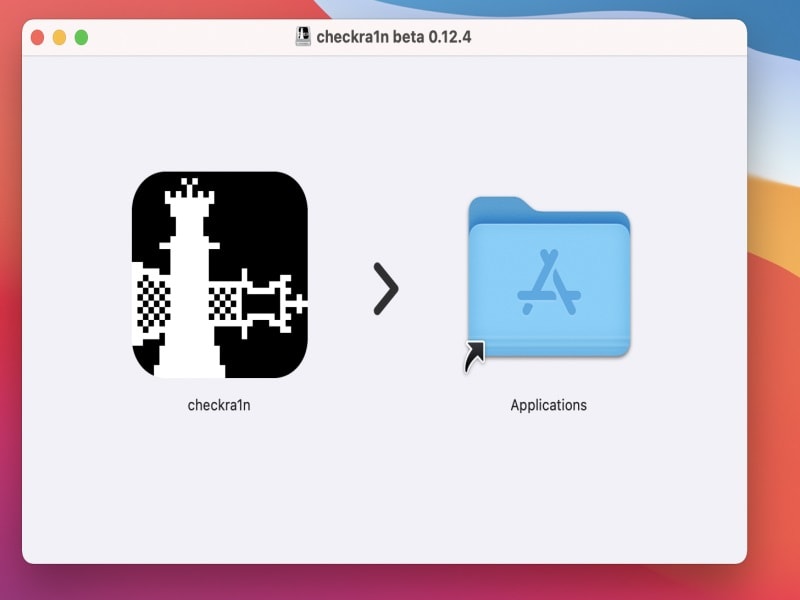
- Step 2. Tap “macOS” and go to “Checkra1n_gui Terminal file” to detect the Apple iPhone 14 device. Now, move ahead by tapping “Start,” you will be led to the screen with instructions for putting the Apple iPhone 14 device into DFU Mode.
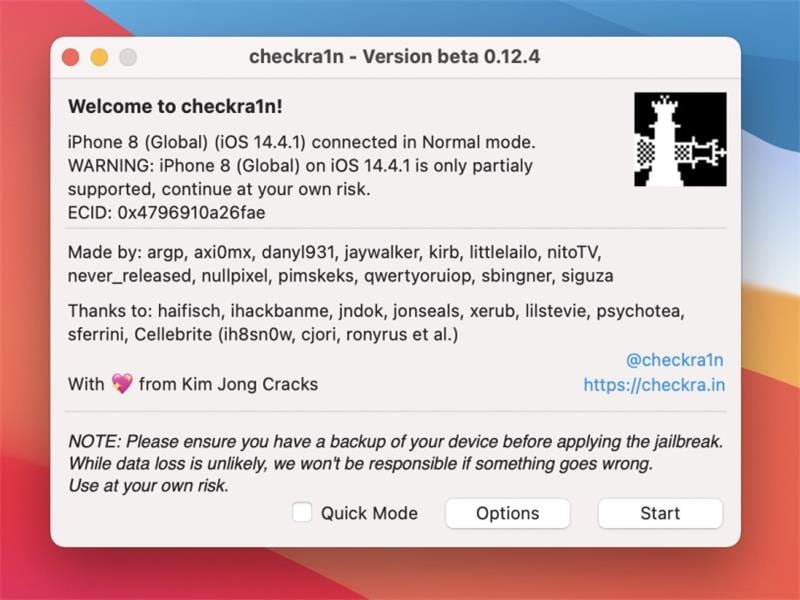
- Step 3. Tap “Next,” put your device into DFU Mode, and press “Start.” Once the Apple iPhone 14 device is in DFU Mode, the jailbreaking process will commence. When it is complete, and your device is jailbroken, tap “Done” to conclude the process.
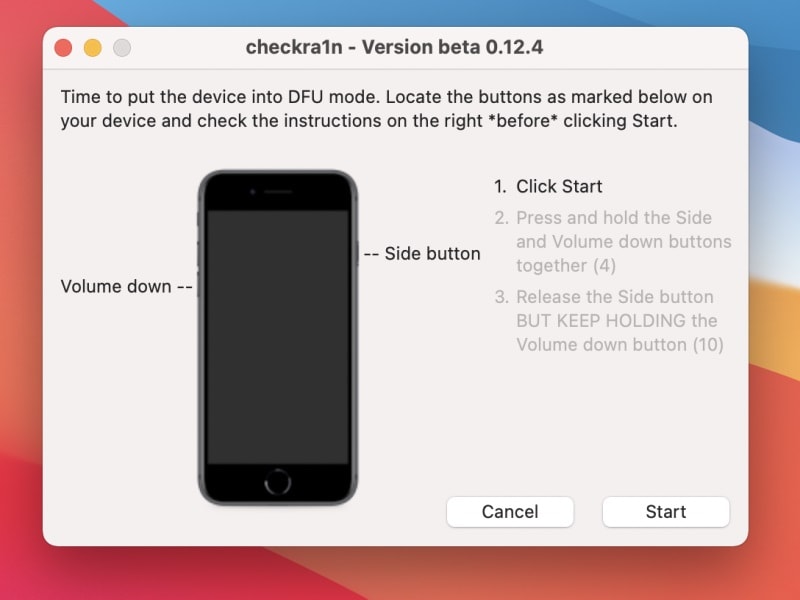
Conclusion
In wrapping up this guide, those seeking to customize their iOS devices can turn to jailbreak. Checkra1n stands out as a favored option for this procedure, but dealing with Checkra1n Error 31 can be an irritating ordeal. The optimal solution is opting for an alternative, such as Wondershare Dr.Fone. This tool offers comprehensive textual and video guides, aiding users in successful jailbreaks.
Tips: Are you searching for a powerful Activation bypass tool? No worries as Dr.Fone is here to help you. Download it and start a seamless unlock experience!
Also read:
- [Updated] 2024 Approved All About Creating Compelling TwitResponses
- [Updated] Double Delight Endless Looping of YouTube Videos for TVs
- 2024 Approved Discreetly Conceal Identity Photo Edit Tip
- 2024 Approved Ultimate 7 Virtual Marksmen Battles
- How to turn off the screen lock on my Vivo Y17s
- How to Unlock Apple ID Activation Lock On iPhone XS Max?
- In 2024, Easy Fixes How To Recover Forgotten iCloud Password From your iPhone 14 Pro Max
- In 2024, Latest Guide on iPad 2/3 and iPhone 8 iCloud Activation Lock Bypass
- In 2024, The Most Effective Ways to Bypass iPhone 11 Pro Max Activation Lock
- The Ultimate Guide to Unlocking Apple Watch Or iPhone XS from iCloud
- Top 7 Skype Hacker to Hack Any Skype Account On your Infinix Note 30 VIP Racing Edition | Dr.fone
- Title: A How-To Guide on Bypassing the iPhone 14 iCloud Lock
- Author: Lydia
- Created at : 2024-10-16 17:27:37
- Updated at : 2024-10-20 16:42:55
- Link: https://activate-lock.techidaily.com/a-how-to-guide-on-bypassing-the-iphone-14-icloud-lock-by-drfone-ios/
- License: This work is licensed under CC BY-NC-SA 4.0.
